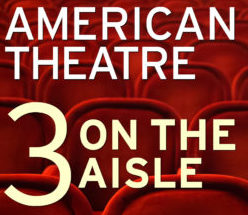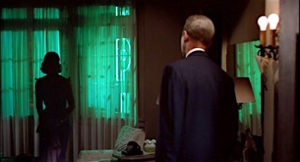 “He’s the final arbiter of how to play two notes. The distance and volume between two notes is always perfect.”
“He’s the final arbiter of how to play two notes. The distance and volume between two notes is always perfect.”
Carla Bley (quoted by Ethan Iverson in “A Lifetime of Carla Bley,” The New Yorker, May 13, 2018)
Terry Teachout on the arts in New York City
 From 2004, immediately after hearing Bob Brookmeyer and his New Art Orchestra perform at the Village Vanguard:
From 2004, immediately after hearing Bob Brookmeyer and his New Art Orchestra perform at the Village Vanguard:
I also wanted to post a few lines tonight, while I’m still bubbling over with the excitement that comes from having heard the kind of performance that reminds us critics of why we do what we do. And no matter how well my column turns out, it won’t be any more to the point than the one-line note scribbled on a cocktail napkin that a musician friend passed to me midway through the first set: “Colors are flooding down the walls.”…
Read the whole thing here.
 “A good writer sets wet wood afire and makes a meal of gravel and sand.”
“A good writer sets wet wood afire and makes a meal of gravel and sand.”
Patrick Kurp, “An Oyster-Like Insensibility” (here, May 11, 2018)
 “The Juggler of Our Lady,” a 1958 Terrytoons CinemaScope cartoon adapted and designed by R.O. Blechman from his book, directed by Al Kouzel, and narrated by Boris Karloff. The score is by Phil Scheib:
“The Juggler of Our Lady,” a 1958 Terrytoons CinemaScope cartoon adapted and designed by R.O. Blechman from his book, directed by Al Kouzel, and narrated by Boris Karloff. The score is by Phil Scheib:
(This is the latest in a series of arts- and history-related videos that appear in this space each Monday, Wednesday, and Friday)
 The latest episode of Three on the Aisle, the twice-monthly podcast in which Peter Marks, Elisabeth Vincentelli, and I talk about theater in America, is now available on line for listening or downloading.
The latest episode of Three on the Aisle, the twice-monthly podcast in which Peter Marks, Elisabeth Vincentelli, and I talk about theater in America, is now available on line for listening or downloading.
In this episode, Peter, Elisabeth, and I, indulging ourselves in a slight touch of vulgarity, talk about the Tony Awards and their perennial discontents:
Instead of the customary who-will-win-who-should-win checklist, the 30TA critics decided to go their own way, taking a cold-eyed look at what’s gone wrong with the Tony telecast (whatever happened to on-air excerpts from the best-play nominees?) and how it reflects fundamental problems with the awards themselves, which implicitly present what gets performed on Broadway as the best of American theater in general. Not only are off-Broadway shows routinely ignored, but this year’s Regional Theatre award is actually going to a long-established New York troupe, La MaMa, instead of being used to publicize a company outside Manhattan….
In the second half of the podcast, we present our own individual “anti-Tony” awards, recognizing achievement in and out of New York
As usual, we wrap up the podcast by discussing recent productions, in New York and elsewhere, that we’ve seen and liked.
To listen, download the episode, read more about it, or subscribe to Three on the Aisle, go here.
In case you missed any previous episodes, you’ll find them all here.
 Titus Techera, who hosts a podcast for the American Cinema Foundation on which he and his guests discuss important films of the past and present, invited me to talk about Alfred Hitchcock’s Vertigo, which turns sixty years old next month, for his latest episode. Our forty-five-minute chat, which I found hugely stimulating, is now available on line. Titus and I went into considerable detail about the film, its legendary cast, the unforgettable score, and—above all—Hitchcock himself. If, like me, you find Vertigo endlessly fascinating and involving, you might want to check out the results.
Titus Techera, who hosts a podcast for the American Cinema Foundation on which he and his guests discuss important films of the past and present, invited me to talk about Alfred Hitchcock’s Vertigo, which turns sixty years old next month, for his latest episode. Our forty-five-minute chat, which I found hugely stimulating, is now available on line. Titus and I went into considerable detail about the film, its legendary cast, the unforgettable score, and—above all—Hitchcock himself. If, like me, you find Vertigo endlessly fascinating and involving, you might want to check out the results.
To listen or download this episode, go here.
* * *
A scene from Vertigo, written by Alec Coppel and Samuel A. Taylor and starring James Stewart and Kim Novak. The score is by Bernard Herrmann:
 Ingrid Bergman performs The Human Voice, Jean Cocteau’s 1930 one-woman play. This production, directed by Ted Kotcheff, was originally telecast on ABC Stage 67 on May 4, 1967:
Ingrid Bergman performs The Human Voice, Jean Cocteau’s 1930 one-woman play. This production, directed by Ted Kotcheff, was originally telecast on ABC Stage 67 on May 4, 1967:
(This is the latest in a series of arts- and history-related videos that appear in this space each Monday, Wednesday, and Friday)
An ArtsJournal Blog